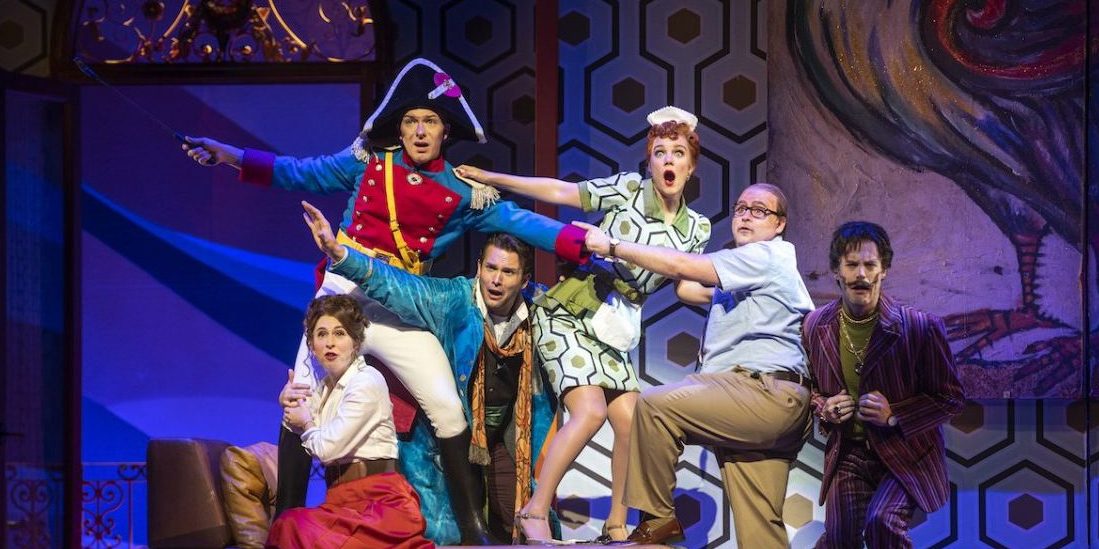Michael Shell’s production of The Barber of Seville contains more farces than usual, perhaps an attempt of the Atlanta Opera to introduce some light into the increasingly dark socio-political climate with the Russian-Ukrainian war and the ongoing Covid-19 pandemic. Indeed, Micah Fortson, the managing director of the opera company, opens the curtain with a speech dedicating the performance to the “many people currently suffering in Europe”. The farces are surprisingly fresh and somehow sophisticated, and Shell dexterously blends the surreal absurdity into Rossini’s virtuosic music without making the opera slapstick.
The story follows the mischiefs of a barber, Figaro, as he helps Count Almaviva in winning the heart of the pretty Rosina and eloping with her, whilst preventing the meddles of Dr. Bartolo, Rosina’s watchful guardian, as he also wants to marry her.
Shell sets this production during Seville’s April Festival in the time of “BC (before cell phones)”, so everything about the setting emits the ambiance of a bright Spanish Festival. The lively coloured stages designed by Shoko Kambara, the costumes by Amanda Seymour, the traditional Sevillian flamenco dancers, matadors, and the huge stilt walker of the festival, each form a piece of the puzzle to create the Spanish mood. In each scene, a board written in Spanish explains the scene-setting: e.g., El Casa, (Home), El Armario (The Closet) La Calle (The Street), etc. The meta declaration of place, again, emphasises the setting in Spain. The audience is also transported back to the 60s/70s, with Rosina’s music teacher, Don Basilio (David Crawford), singing like Freddie Mercury, and Count Almaviva (Taylor Stayton), dressed as a hippie, holding a sitar and sashaying around on stage.
The star of the night is Milanese bass-baritone, Giovanni Romeo singing as Dr. Bartolo, an ophthalmologist, and a “rooster in the hen”. This being his American debut, Romeo sings captivatingly and is hugely entertaining. Dr. Bartolo is a collector of rooster paraphernalia, mirroring his own personality as he himself acts like one. He combs his hair up to mimic the rooster comb and crows around on the stage. This bizarre behaviour elicits laughs from the audience.
Stephanie Lauricella, with her sonorous voice is impressive as Rosina, especially in the “Una voce poco fa”. She gives the character much passion and ambition. The role of Berta only provides one aria with which to showcase singing skills, but Cadie J. Bryan captivates the audience in “Il vecciotto cerca moglie” with a dazzling voice. Taylor Stayton plays Count Almaviva. His bright bel canto timbre is elegant, but he is too busy acting comical and flailing around stage whilst going between a drunken soldier and a hippie music teacher, that he cannot perfect his singing. Joseph Lattanzi who plays Figaro wears a flamboyant blue long coat adorned with many big eyes, perhaps symbolising the age of enlightenment. It makes sense as Pierre Beaumarchais’ trilogy, in which Figaro is the protagonist, and the first of which is the original source of The Barber of Seville was written during the Age of Enlightenment.
Music Director of the Atlanta Opera, Arthur Fagen conducts the Atlanta Opera Orchestra with deliberate speed, comfortable for the singers.
This production of the Barber of Seville is utterly uplifting, making you forget the daily nuisances of life and be hopeful for tomorrow.

